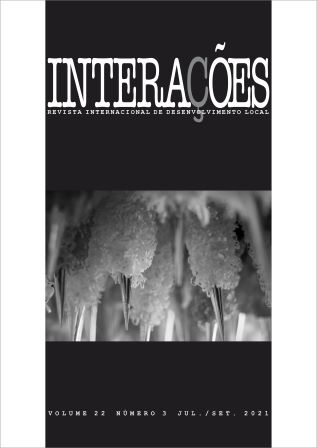Networks in the context of digital culture: technologies, coordinators, university teachers and students
Keywords:
digital culture, formative educational process, virtual etnography approach, technologiesAbstract
This research aims to analyze networks of relations in the context of digital culture, focusing on the relationships among technologies, coordinators, university teachers, and students. It is qualitative research with virtual etnography approach, developed in a private university in the Center-West of Brazil, with the participation of 39 university teachers, 285 students and 7 coordinators, answering questionnaires and semi-structured interviews, and posting messages at Facebook, related to the digital culture and to the formative educational process. The results point to a context of mismatch between the comings and goings of university teachers, students and coordinators, seeking to appropriate the technologies in order to invent other ways of teaching and learning, in different times and spaces, individually and collaboratively, with openness to the innovation in a critical way.
References
BANNELL, R. I.; DUARTE, R.; CARVALHO, C.; PISCHETOLA, M.; MARAFON, G.; CAMPOS, G. H. B. Educação no século XXI: cognição, tecnologias e aprendizagens. Petrópolis: Vozes; Rio de Janeiro: PUC, 2016.
BARRETO, R.G. (Org.). Tecnologias educacionais e educação a distância: avaliando políticas e práticas. Rio de Janeiro: Quartet, 2001.
CAZELOTO, E. Apontamentos sobre a noção de “democratização da internet”. In: TRIVINHO, E.; CAZELOTO, E. A cibercultura e seu espelho: campo de conhecimento emergente e nova vivência humana na era da imersão interativa. São Paulo: ABCiber; Instituto Itaú Cultural, 2009.
FLORIDI, L. (Ed.). The onlife manifesto: being human in a hyperconnected era. London: SpringerOpen, 2015. 255 p. Disponível em: https://link.springer.com/content/pdf/10.1007%2F978-3-319-04093-6.pdf. Acesso em: 10 fev. 2020.
FREIRE, P. Política e educação. São Paulo: Cortez, 1993.
GUAZZELLI, D. C. H. R. Inovações pedagógicas com o uso de tecnologias. In: GOMEZ, M. V. Círculo de Cultura Paulo Freire: arte, mídia e educação. São Paulo: Fundação Memorial da América Latina, 2015.
HERNÁNDEZ, F.; SANCHO, J. M.; CARBONELL, J.; TORT, A.; SIMÓ, N.; SÁNCHEZ-CORTÉS, E. Aprendendo com as inovações na escola. Porto Alegre: Artmed, 2000.
HINE, C. Virtual ethnography. London: SAGE Publications, 2000.
HINE, C. Por uma etnografia para a internet: transformações e novos desafios. [Entrevista concedida a] Christine Hine. MATRIZes, São Paulo, v. 9, n. 2, p. 167-73, jul./dez. 2015.
IMBERNÓN, F. Formação docente e profissional: formar-se para a mudança e a incerteza. São Paulo: Cortez, 2004.
KENSKI, V. Tecnologias e Ensino presencial e a distância. Campinas: Papirus, 2003.
LEMOS, A. A cibercultura como território recombinante. In: TRIVINHO, E.; CAZELOTO, E. A cibercultura e seu espelho: campo de conhecimento emergente e nova vivência humana na era da imersão interativa. São Paulo: ABCiber; Instituto Itaú Cultural, 2009.
LESSIG, L. Remix: making art and commerce thrive in the hybrid economy. New York: The Penguin Press, 2008.
LÉVY, P. Cibercultura. 3 ed. São Paulo: Editora 34, 2010.
MARTÍN-BARBERO, J. Dos meios às mediações. Rio de Janeiro: UFRJ, 2003.
MINAYO, M. C. S. Pesquisa social: teoria, método e criatividade. 32. ed. Petrópolis: Vozes, 2012.
MOREIRA, J. A.; SCHLEMMER, E. Por um novo conceito e paradigma de educação digital onlife. Revista UFG, Goiânia, v.20, n. 26, p. 63438, 2020.
PRETTO, N.; SILVEIRA, S. A. Além das redes de colaboração: internet, diversidade cultural e tecnologias do poder. Salvador: EDUFBA, 2008.
SANTOS, E. A cibercultura e a educação em tempos de mobilidade e redes sociais: conversando com os cotidianos. In: FONTOURA, H. A; SILVA, M. (Org.). Práticas pedagógicas, linguagem e mídias: desafios à pós-graduação em Educação em suas múltiplas dimensões. Rio de Janeiro: ANPEd Nacional, 2011.
SANTOS, E. Pesquisa-formação na cibercultura. Santo Tirso: Whitebooks, 2014.
SILVA, R. N. K. O perfil necessário ao professor frente à influência da cibercultura no contexto educacional. ReDoC- Revista Docência e Cibercultura, Rio de Janeiro, v. 4, n. 2, p. 103-18, 2020.
Downloads
Published
How to Cite
Issue
Section
License
Direitos Autorais para artigos publicados nesta revista são do autor, com direitos de primeira publicação para a revista. Em virtude de aparecerem nesta revista de acesso público, os artigos são de uso gratuito, com atribuições próprias, em aplicações educacionais e não-comerciais.


